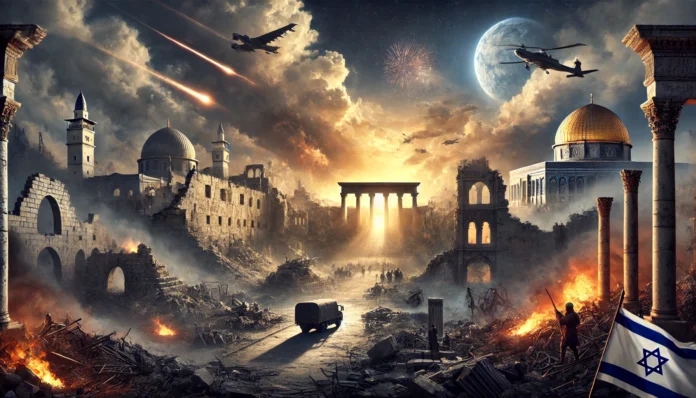CURTA, COMENTE E COMPARTILHE!!!
Tishá BeAv, o 9º dia do mês de Av no calendário judaico, normalmente cai em julho ou agosto no calendário gregoriano. Em 2024, por exemplo, Tishá BeAv será observado do pôr do sol de 12 de agosto até o anoitecer de 13 de agosto. Este dia de jejum e luto é profundamente significativo para o povo judeu, pois marca a destruição do Primeiro e do Segundo Templo de Jerusalém, eventos que simbolizam grandes perdas e exílios. A destruição do Primeiro Templo por Nabucodonosor II em 586 a.C. e a destruição do Segundo Templo pelos romanos em 70 d.C. são lembradas como momentos de imensa tristeza e reflexão sobre as tragédias históricas que moldaram a identidade judaica.
Nos tempos atuais, as ameaças contínuas de destruição enfrentadas por Israel, especialmente vindas do Irã, ressoam profundamente com os sentimentos de vulnerabilidade e resistência que Tishá BeAv simboliza. As repetidas declarações de líderes iranianos sobre a intenção de destruir Israel trazem à tona memórias históricas de perseguição e destruição, lembradas dolorosamente no dia de Tishá BeAv.
Este contexto moderno sublinha a importância de Tishá BeAv não apenas como um dia de luto pelo passado, mas também como um momento de reflexão urgente sobre a necessidade de defender a soberania e a segurança do Estado de Israel. Não é apenas uma coincidência que essas ameaças se alinhem com um dia de profunda significância histórica; elas ressaltam a necessidade vital de vigilância, unidade e preparação frente a perigos existenciais.
Tishá BeAv serve como um poderoso lembrete da resiliência histórica do povo judeu. A data não é apenas uma oportunidade para lamentar, mas também para uma ação consciente contra as ameaças contemporâneas. Em um mundo onde a paz e a estabilidade são frequentemente ameaçadas, Tishá BeAv destaca a importância da diplomacia, da solidariedade internacional e do fortalecimento das defesas nacionais. Este dia de luto também convida à reflexão sobre a necessidade de superar o ódio e promover a harmonia entre as comunidades, lembrando-nos das consequências devastadoras da intolerância e da discriminação.
Enquanto Tishá BeAv rememora tragédias passadas, ele se conecta profundamente com os
desafios contemporâneos enfrentados por Israel. As ameaças do Irã não são apenas retóricas; elas ecoam através dos séculos de perseguição que os judeus enfrentaram. Esta conexão entre passado e presente reforça a importância de Tishá BeAv como um dia de reflexão e renovação do compromisso com a paz, a segurança e a justiça.
A data, observada no calendário gregoriano em julho ou agosto, nos convida a lembrar a história e a permanecer vigilantes e unidos frente às ameaças atuais, reafirmando a resistência do espírito humano e a determinação de lutar pela sobrevivência e prosperidade do povo judeu e de toda a humanidade.
A interseção das ameaças históricas e contemporâneas não é meramente uma coincidência, mas um chamado urgente para a defesa contínua da paz mundial.
Remembrance and Vigilance
Historical Tragedies and Modern Threats

Tishá BeAv, the 9th day of the month of Av in the Jewish calendar, typically falls in July or August in the Gregorian calendar. In 2024, for instance, Tishá BeAv will be observed from the evening of August 12 until nightfall on August 13. This day of fasting and mourning is profoundly significant for the Jewish people, as it marks the destruction of the First and Second Temples in Jerusalem—events that symbolize great losses and exiles. The destruction of the First Temple by Nebuchadnezzar II in 586 BCE and the destruction of the Second Temple by the Romans in 70 CE are remembered as moments of immense sorrow and reflection on the historical tragedies that have shaped Jewish identity.
In contemporary times, the ongoing threats of destruction faced by Israel, particularly from Iran, deeply resonate with the feelings of vulnerability and resistance that Tishá BeAv symbolizes. The repeated declarations by Iranian leaders of their intent to destroy Israel evoke historical memories of persecution and destruction, painfully remembered on Tishá BeAv.
This modern context underscores the importance of Tishá BeAv not only as a day of mourning for the past but also as a moment of urgent reflection on the necessity of defending the sovereignty and security of the State of Israel. It is not merely a coincidence that these threats align with a day of profound historical significance; they highlight the vital need for vigilance, unity, and preparedness in the face of existential dangers.
Tishá BeAv serves as a powerful reminder of the historical resilience of the Jewish people. The day is not only an opportunity for lamentation but also a call to conscious action against contemporary threats. In a world where peace and stability are frequently threatened, Tishá BeAv emphasizes the importance of diplomacy, international solidarity, and the strengthening of national defenses. This day of mourning also invites reflection on the need to overcome hatred and promote harmony among communities, reminding us of the devastating consequences of intolerance and discrimination.
While Tishá BeAv commemorates past tragedies, it deeply connects with the contemporary challenges faced by Israel. The threats from Iran are not merely rhetorical; they echo through centuries of persecution endured by the Jewish people. This connection between past and present reinforces the importance of Tishá BeAv as a day of reflection and renewal of commitment to peace, security, and justice.
Observed in the Gregorian calendar in July or August, Tishá BeAv calls us to remember history and remain vigilant and united against current threats, reaffirming the resilience of the human spirit and the determination to fight for the survival and prosperity of the Jewish people and all humanity.
The intersection of historical and contemporary threats is not merely a coincidence but an urgent call for the continuous defense of world peace.





Muito bom
Neste mundo não existem puras coincidências, basta desvendar para se concluir.. In this world there are no pure coincidences, you just need to unravel them to conclude…